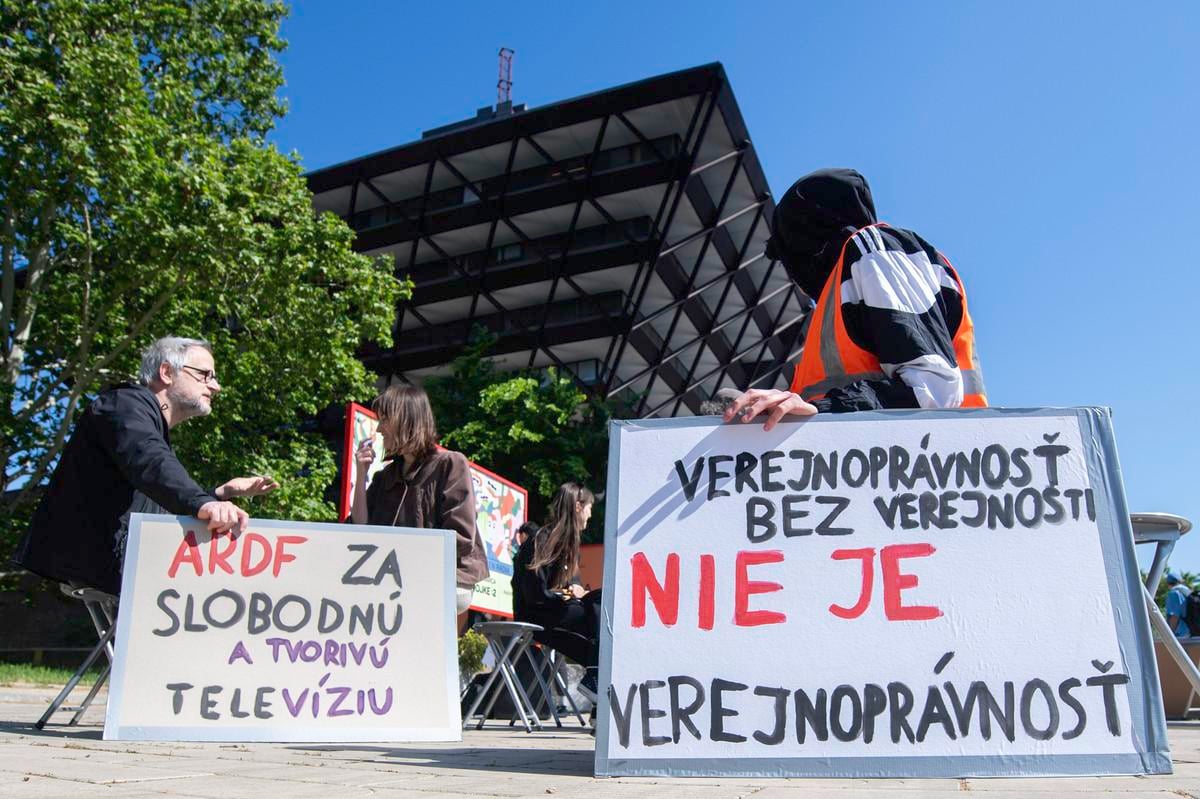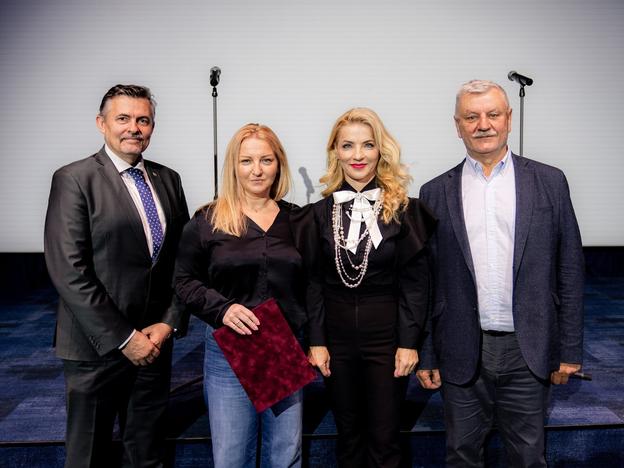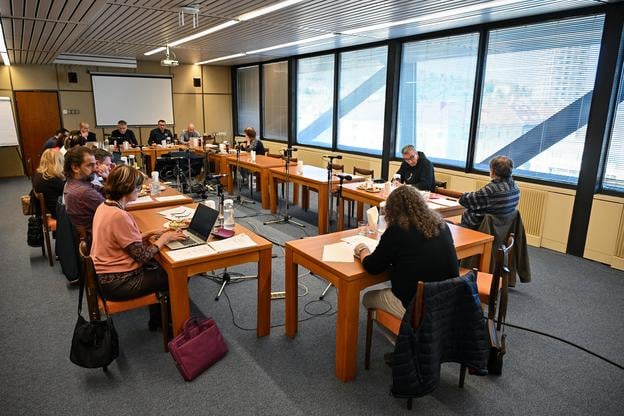Shortly before the election of a new director general of STVR – Slovak Television and Radio – on May 12, a small group of mostly university arts students gathered outside the Slovak Public Radio building to stage a silent protest. They placed empty chairs and banners on the ground, bearing messages such as “About us without us” and “Excluding the public”.
They were not alone. The opposition party Slovensko held a press conference at the same location, denouncing the vote as a “farce” after initially being denied entry and later barred from questioning candidates.
Inside, a 7–2 majority of the STVR Council, a body under government control, selected Martina Flašíková as director general in a closed-door vote. A television producer with little public profile until recently, Flašíková is the daughter of Fedor Flašík, a political strategist who led an election campaign for the ruling Smer party in the past. She defeated four other candidates, including interim director Igor Slanina, and will serve a six-year term.
The election process was conducted in near-total secrecy. Journalists and members of the public were excluded, despite constitutional guarantees of public access to such hearings. A livestream was the only means of observation. Candidates’ CVs and project proposals were not released in advance. While the law permits media presence at council meetings, the council has grown increasingly resistant to transparency.
Legal experts say this marks a troubling departure from democratic norms and likely violates Slovakia’s laws on public oversight. The Film and Television Faculty at the Academy of Performing Arts called the process “alarmingly untransparent”.
“What happened on May 12 marked the culmination of a year-long effort by the governing parties, particularly the SNS [Slovak National Party], which oversees the Culture Ministry, to take control of this public institution,” said opposition MP Jozef Hajko of the Christian Democratic Movement.
The council’s deliberations were especially opaque. Members declined to debate candidates’ projects. “I believe everyone should form their own opinion,” said council chair Ján Krošlák, a former spokesperson for semi-authoritarian Prime Minister Vladimír Mečiar, who ruled Slovakia in the 1990s.
Flašíková’s appointment comes at a tense time for Slovak media. STVR was created after the 2024 dissolution of its predecessor, RTVS [Radio and Television of Slovakia], as part of sweeping government reforms. Though officials framed the move as a depoliticisation effort, critics saw a calculated power grab. Early signs at STVR suggest the latter: its supervisory board includes allies of the Smer and SNS parties, among them Lukáš Machala, an SNS defector and co-author of the law that dismantled RTVS, and David Lindtner, an adviser to Prime Minister Robert Fico.
The Council’s advisory Ethics Committee has also raised eyebrows. One controversial appointee is Eduard Chmelár, a former Fico adviser and a known figure in the disinformation media ecosystem. The committee is tasked with monitoring ethical standards among STVR employees and contributors.
Flašíková’s 80-page vision statement, Ground Zero, outlines an overhaul of the broadcaster and calls for greater pluralism. She describes a “chronic crisis” at STVR and challenges the notion of a singular journalistic truth. “It is not the role of public service journalism to preach the only truth,” she writes. “Its role is to open space for many truths so that the viewer or listener can decide freely, understand, and trust.”
She also notes that the broadcaster lacks a clear identity, a stable audience, and consistent production quality. Yet many of her proposals remain vague on implementation. One suggestion – closing the STVR sports channel if broadcasting rights prove unaffordable – has drawn criticism. Her most ambitious idea is a National News System that would integrate STVR’s newsroom with the state-run TASR news agency. Flašíková herself admitted uncertainty over whether TASR would support the plan.
Flašíková, 46, assumes leadership with limited autonomy. Unlike in the past, when the director general was elected by parliament, today’s STVR Council holds that power – and can dismiss her at will. “This council can dismiss the director at any time – essentially for any reason. The autonomy of STVR’s leadership is thus significantly weakened,” said Zora Jaurová, an opposition MP for Progressive Slovakia. Still, she acknowledged that Flašíková’s project was among the best-prepared.
Funding is another challenge. Flašíková backs restoring the broadcaster’s budget allocation to 0.17 percent of GDP – a target set by the previous OĽaNO-led government. The current Smer-Hlas-SNS coalition reduced it to 0.12 percent in late 2023.
Her April appointment as head of programming for STVR’s television division came as a surprise. Her background includes producing talent shows, TV series and films. Notably, she worked on Pumpa (Petrol Station), a satirical RTVS series that once drew criticism from some of her current political backers. Defending the show during her hearing, Flašíková said: “It featured many guests and sensitive topics. It was never our intention to ridicule the death of General Milan Lučanský.” Lučanský, a former police chief who served under the 2018–2020 Smer-led government, died by suicide in custody under a previous government – an event the ruling coalition claims was politically motivated. “After the broadcast, we received hate messages and even bullets in our production offices,” she said. “But I still believe humour and satire belong on STVR.”
Yet questions about her independence remain. Flašíková co-owns the pro-government outlet eReport with her sister through New Story Media. Founded by their late father, the portal has been criticised for biased coverage. Weeks before her election, Flašíková signed a cooperation agreement with the Foreign Ministry pledging favourable media coverage of government actions. She now promises to sever business ties with eReport within 30 days, but critics argue the damage has already been done.
“Choosing Flašík’s daughter to run public radio and television is a huge risk. This could soon become just another propaganda channel,” said Slovensko party leader Igor Matovič.
The choice to pass over interim director Slanina – widely regarded as competent but seen as insufficiently loyal to the ruling coalition – has only intensified allegations of political favouritism. SNS MP Roman Michelko all but confirmed this, saying Slanina had “misunderstood” the government’s expectations.
Slovakia now ranks 38th globally in the Reporters Without Borders press freedom index – its lowest position in over a decade.
With the European Commission set to begin enforcement of the new Media Freedom Act in August, Slovakia may soon become a test case for Brussels.
Flašíková remains publicly confident. “I will fulfil the vision I outlined in my project,” she said. But her critics are sceptical that she will be allowed to. “STVR Council is a politically appointed body with vast powers,” MP Hajko said. “Flašíková may turn out to be nothing more than a puppet in the hands of the Council.”


